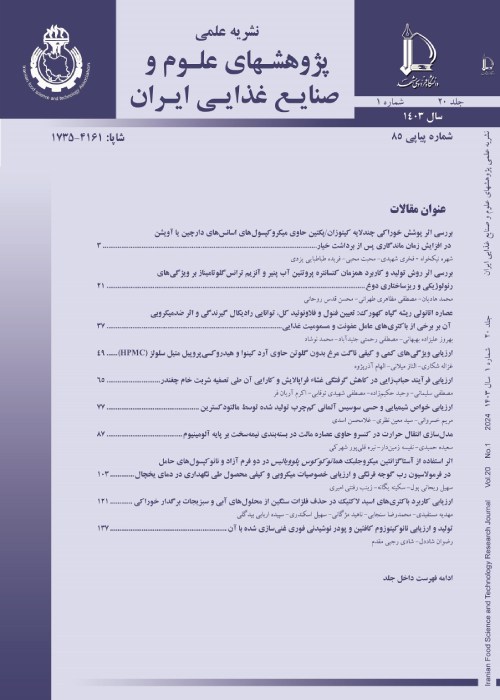Investigation of the Impact of Gallic Acid, Methyl Gallate and their Combination on the Oxidative Stability of Frying Oli
Thermal process is the most prominent option for treating foods. During the heat treatment, food nutrients response simultaneously but adversely under pH, temperature, moisture, and other provided conditions. It might result in an irreversible transformation of composition and structure that influences oxidative stability and sensory properties. The use of antioxidants is one of the most common methods to prevent edible oils oxidation. Safety concerns of synthetic antioxidants including tert-butylhydroquinone (TBHQ) as food additives have led to increasing demands for natural ones. Phenolic compounds such as Gallic Acid (GA) and Methyl Gallate (MG) represent to possess markedly high activity to scavenge free radicals which are among the most powerful natural sources of oxidative inhibitors in foods. Apart from their antioxidant activity, GA and MG also exhibit multiple biological characteristics such as anti-atherogenic, anti-spasmodic, and anti-microbial activities. This study aimed to investigate the oxidative stability of the in-use sunflower (S) and palm (P) oils as affected by the GA, MG, (GA+MG), and TBHQ to clarify their antioxidant behavior.
Antioxidants Gallic acid, Methyl gallate and TBHQ (Purity>98%) were purchased from Sigma Aldrich, USA. All solvents and chemicals were provided from Merck, Germany and Sigma Aldrich, USA with analytical grade. Antioxidant-free sunflower and palm oil were prepared from Three Goals factory, Neyshabur, and potatoes (Agria variety) from Fariman region, Khorasan Razavi.
Chemical changes, oxidative stability and quality indices of the in-use sunflower oil (S) and palm (P) (65:35 w.t. %) were evaluated during 8-hour heat treatment at 180 °C through GA, MG, GA/MG (25:75, 50:50 and 25:75) and TBHQ. All experiments were carried out in quadruplicate, and data were subjected to analysis of variance (One-way-ANOVA). Mean data were compared based on Duncan's multiple range test at 5% level (p<0.05). Observations of the chemical properties showed that sample S mainly contained Linoleic fatty acid (61.53%) and Oleic acid (25.50%) and for sample P, Oleic acid (41.90%) and the saturated long-chain fatty acid of Palmitic acid (38.9%). Also, the total phenolic content (TPC) and tocopherol (TTC) of sample P were 53.12 and 185)µg.g-1(, respectively, and sample S were 36.01 and 490 )µg.g-1(. The results of oxidation stability test were analyzed based on Carbonyl value (CV), Conjugated diene value (CDV) and acidity (FFA) parameters. According to our findings, all parameters increased significantly at different speeds during the heat treatment (p<0.05). Moreover, the oxidative stability of the in-use oil was significantly promoted by the antioxidants added, meaning that the control treatment and the treatment containing synthetic antioxidant TBHQ had the highest and lowest FFA%, respectively. The CDV of the antioxidant-free treatment was reduced by 68.6% in the presence of GA75+MG25.In addition, the CV change rate of the antioxidant-free sample in the presence of TBHQ was reduced by 70.2%. It was concluded that the natural antioxidants were capable of being competed with TBHQ antioxidants.
The results of this study showed that the heat treatment affected the nutritional value, quality indexes and chemical structure of the treatments, decreasing the quality and stability of the oil. As observed, all FFA, CDV and CV parameters increased significantly at different speeds during 8-hour frying process. The analysis also indicated that the oxidative stability of the treatments increased at the presence of antioxidants during the heat treatment at 180 °C. Thus, the control treatment and the treatment containing synthetic antioxidant TBHQ had the highest and lowest acidity, respectively. Also, the CDV of the antioxidant-free treatment decreased by 68.6% in the presence of GA75+ MG25. In addition, the rate of CV changes was declined by 70.2% through the TBHQ. The results indicated the key role of this synthetic antioxidant in preventing the formation of secondary compounds in the advanced stages of oxidation.It is evident that most synthetic antioxidants are volatile and heat sensitive. Furthermore, there are some limitations in applying TBHQ to promote oxidative stability of food products due to its toxic potential. Evidences have also been reported on the mutation caused by the synthetic antioxidant TBHQ in the living organism's body. Compared to synthetic antioxidants, natural polyphenolic antioxidants such as MG and GA which widely distribute in plants mainly have antioxidative properties. Compared to GA and MG, GA+MG antioxidants have a longer induction period and higher oxidative stability. Promoting oxidative stability with such an arrangement of antioxidants is a good option in taking advantage of this class of natural antioxidants. According to the results of this study, it can be inferred that with a slight increase in natural antioxidants levels, we might be able to obtain the oxidative stability level comparable to the behavior of synthetic antioxidant TBHQ. Of course, it is worth noting that the addition of natural antioxidants to food such as edible oils should also be done according to national and international standards.
- حق عضویت دریافتی صرف حمایت از نشریات عضو و نگهداری، تکمیل و توسعه مگیران میشود.
- پرداخت حق اشتراک و دانلود مقالات اجازه بازنشر آن در سایر رسانههای چاپی و دیجیتال را به کاربر نمیدهد.


